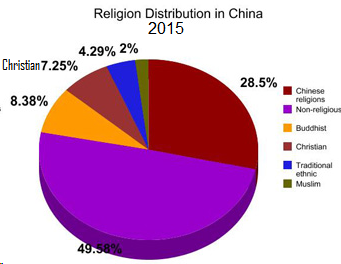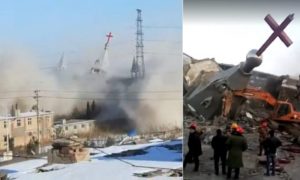Many commentators and experts argue that China has undergone such substantial changes that it is no longer a Communist, Maoist, or Marxist system, but a somehow moderate system of centralized capitalism.
Nonetheless, the current dictator has been consolidating his power in recent months and has been affirming it even further since the Covid-19 crisis unleashed. In fact, President Xi Jinping also leads the nation's Communist Party and he recently moved to be made president-for-life through the elimination of term limits. This means that he and his Party have shielded the traditional Chinese totalitarian system to effectively control all aspects of Chinese citizens' lives. In other words, their agenda is to maintain power through a sort of "Sinicization", forcing their subjects to comply with what they claim are "Chinese cultural norms".
However, this system is not part of a legitimate aspect of historical Chinese culture but of the Party's repressive policies truly reflective of militaristic, totalitarian (so called Communist) rule violently forced upon the Chinese people since Mao Zedong grab power 70 years ago.
Among the most outstanding repressive signs of this regime are the coercive family planning policies that go so far as to force abortions, as well as spying on its population through video and other digital monitoring (e.g. massive implementation of facial recognition with no legal procedures involved) and a system of measuring each citizen according to Party loyalty through centrally documented indexes called the "social credit score system", thus controlling each individual's social status and opportunities in their lives. In addition, China has a very limited degree of religious tolerance that allows a restricted practice of Buddhism, Daoism, Islam, Catholicism, and Protestantism only. No  other belief is permitted; not even under state control.
other belief is permitted; not even under state control.
Another repressive sign is severe religious persecution, primarily among Christians and focusing especially on Catholics. Although the Party has lately appeared to conform to moderate atheism by granting some very limited liberties to Christians, their leaders realize that it is neither possible nor advisable to imprison and torture more than 100 million Christians (up from 6 million in 1980) in an astonishing proliferation of believers in present day China. However, they go to the jugular to eradicate their perceived foe by fiercely imprison and torture many church leaders.
They are very much aware of this outstanding Christian growth and have adopted a policy to control the phenomenal increase in the number of believers, adopting at the same time a more subtle approach to the oppression of Christians. Therefore, the Party is allowing just enough religious freedom to participate in the Party controlled church, called the "Three-Self Patriotic Movement". Those who do not submit have no other option but to gather in small groups underground that are known in the West as "house churches". A sort of modern catacombs.
Facing the sad reality of the ruling Chinese Communist Party asserting its control over all religious practices among its citizens, the Vatican will only have limited control over the Chinese Catholic Church after agreeing on a bilateral deal on the appointment of bishops that will have to be approved by the Chinese government. It is quite remarkable how this agreement took place nearly two years after a white paper on religious affairs published in the State controlled media on April 2018 asserted government control on religion: "Religions in China must be Chinese in orientation and provide active guidance to religions so that they can adapt themselves to the socialist society". Religious believers must "be subordinate to and serve the overall interests of the nation and the Chinese people . . . and support the leadership of the Chinese Communist Party," the white paper said, which includes "integrat[ing] religious teachings and rules with Chinese culture." 
The Council on Foreign Relations recently reported: «Over the past twenty-five years, China ranked tenth as a country where it is most difficult and dangerous to practice Christianity, according to Open Doors, a U.S.-based Christian nonprofit that tracks the persecution of Christians worldwide. Repression campaigns ebb and flow. While house and underground churches traditionally faced the brunt of persecution, under Xi’s leadership state-sanctioned churches have been targeted as well. Recent repression efforts target both house and state-sanctioned churches through the harassment and detention of Christian believers, blocking entry to sites of worship, interrupting gatherings, dismantling crosses, demolishing churches, and disbanding congregations.»

In brief, the Communist Party of China is in complete control of the country, from government to police to military to the whole of civil society. With some 90 million members (among 1.4 billion inhabitants), it is organized like a pyramid, with the Politburo and eventually President Xi Jinping at the top. Loyal membership is essential for anyone who wants to climb the career ladder - whether in politics, business or even entertainment. That even goes for people like e-commerce giant Alibaba's Jack Ma; telecomm company Huawei's founder Ren Zhengfei; or celebrities like actress Fan Bingbing. If they are seen to go against party ideals, they have to publicly apologize to save themselves from secret detention and persecution.
While there is a parliament, the National People's Congress, it merely rubberstamps the decisions taken by the party leadership. The party also has a tight grip on the media and the internet to silence dissent. China is effectively a one-party country. The National Party Congress elects a Central Committee which in turn elects the Politburo, but these elections are usually decided and approved beforehand and the real powers rest with the Politburo.
Repression of those who speak out against the authorities shows no signs of abating and a crackdown on human rights has intensified under President Xi.
Comments powered by CComment